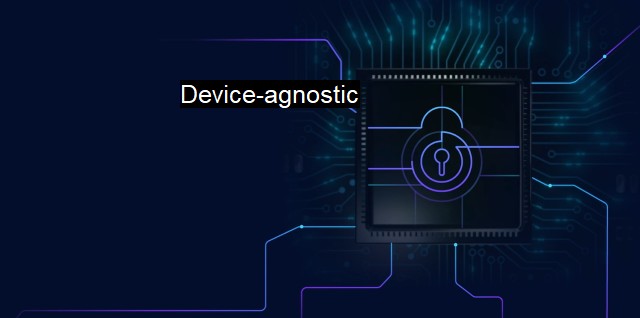What is Device-agnostic?
The Importance of Choosing Device-Agnostic Cybersecurity and Antivirus Solutions
"Device-agnostic" is a term frequently used in the field of technology, specifically in cybersecurity and antivirus programming, to refer to software, applications, or websites that can function on any device or operating system. The same type of technology can be applied to different devices, and it can work without customization. this tool is indifferent to the type and nature of the device it's placed on; hence it is called "device-agnostic."Brevity is the key virtue of device-agnostic technology. It can be programmed once and deployed across various platforms without extensive coding changes, consequently reducing development and maintenance costs. Thus, developers can focus more on refining the user experience across devices, rather than on solving compatibility issues between different software and hardware configurations.
Being device-agnostic signifies that the security software is designed to secure and shield any device, irrespective of its operating system, hardware, or manufacturer. A device-agnostic antivirus can provide security against malware for a broad array of devices, such as laptops, smartphones, tablets, workstations, and servers, irrespective of whether they are running on Windows, macOS, Android, iOS or Linux.
As the number of devices connecting to the internet continues to grow at a staggering rate, so does the potential for cyber threats. The severity of these threats is further amplified by the ongoing technological fragmentation which implies a massive diversification of electronic devices and operating systems. In this fragmented technology landscape, a device-agnostic approach provides a robust defense strategy. It eliminates the need for individual device-level solutions for each device and precautions against frequent and ongoing cyber threats, hence offering a comprehensive solution.
Adopting a device-agnostic approach in cybersecurity enables easy deployment and architecture, making it practical and efficient for all network devices to be protected under a single umbrella, including devices under the rapidly expanding Internet of Things (IoT). By taking into account how these threats can penetrate different machines and systems, a device-agnostic antivirus software provides a single solution regardless of the type of hardware or software. This increases cost-effectiveness and makes deploying security measures more manageable for businesses of all sizes.
Device-agnostic cybersecurity strategies are better equipped to cope with zero-day vulnerabilities - unknown flaws or loopholes in software that consistently stay exposed until spotted and exploited by hackers or resolved by developers. Cybersecurity that is device-agnostic can detect and handle these zero-day vulnerabilities more swiftly and efficiently due to its broad coverage.
One must not believe that including device-agnostic security software prevents all security risks. Individuals and organizations must still adopt practices advocating cybersecurity. It should be an inherent part of the user's life to regularly update their software and ensure that their cybersecurity software stays up-to-date, further fortifying defence against cyber invasions.
Device-agnostic technology in the domain of cybersecurity, antiviral and antimalware protection offers an effective approach to device security. It is high-performing, efficient, and cost-effective, as it covers all devices and operating systems without the necessity for persistent modifications or adjustments, while guards against an extensive range of internet threats. Businesses must consider a comprehensive, device-agnostic cybersecurity system as a sound security measure along with other necessary security protocols to counter the ever-growing pressure of the online threat environment.

Device-agnostic FAQs
What does device-agnostic mean in cybersecurity and antivirus?
Device-agnostic refers to software, applications, or systems that can run on any device or operating system without any compatibility issues, providing a unified approach to cybersecurity and antivirus.What are the benefits of using device-agnostic cybersecurity and antivirus solutions?
Device-agnostic solutions provide consistent security across multiple devices and platforms, simplifying management and reducing the risk of vulnerabilities. They also enable organizations to adopt a unified security strategy, regardless of the devices or operating systems in use.Do device-agnostic cybersecurity and antivirus solutions provide the same level of protection as device-specific solutions?
Yes, device-agnostic solutions provide the same level of protection as device-specific solutions, as they are designed to cover all possible devices and operating systems. However, it is important to choose a reputable and reliable cybersecurity and antivirus provider to ensure the quality and effectiveness of the solution.How do device-agnostic cybersecurity and antivirus solutions support remote workforces and BYOD policies?
Device-agnostic solutions are ideal for remote workforces and BYOD policies, as they enable employees to use any device or operating system without compromising security. This flexibility allows employees to work from anywhere and on any device, providing greater productivity and convenience while maintaining security standards.Related Topics
Endpoint security Internet of Things (IoT) security Mobile device security Multi-factor authentication Data encryption
| | A | | | B | | | C | | | D | | | E | | | F | | | G | | | H | | | I | | | J | | | K | | | L | | | M | |
| | N | | | O | | | P | | | Q | | | R | | | S | | | T | | | U | | | V | | | W | | | X | | | Y | | | Z | |
| | 1 | | | 2 | | | 3 | | | 4 | | | 7 | | | 8 | | |||||||